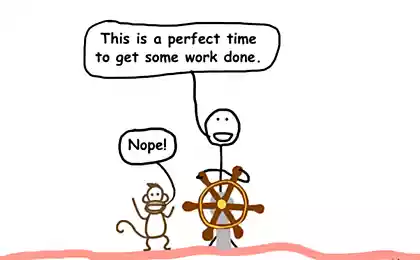180
5 things in life that we do not know how to foresee

5 things in life that we do not know how to foresee
The world is built in such a way that very little can affect the largest, so predictions become impossible.
Every day we make plans, hope for the best and try to control the future. But life constantly reminds us of its unpredictability. From chance encounters that change fate to global crises that turn the world upside down, there are aspects of reality that are fundamentally impossible to predict.
1. Emergent properties of complex systems
Imagine an anthill. Each individual ant follows simple rules: find food, bring it to the colony, follow the pheromone trail. None of them plan to build complex tunnels or establish an effective division of labor. Yet from these simple interactions emerges a surprisingly complex and organized structure—what scientists call emergent properties.
Practical advice: When working with teams, don’t try to control every detail. Create clear rules of engagement and let the system self-organize. Often the result will exceed the wildest expectations.
The same thing happens in the economy, in society and even in our minds. Stock markets exhibit behaviors that cannot be predicted by analyzing the actions of individual traders. Internet memes are distributed according to laws that cannot be explained by the logic of the content creators. Your personality is formed from trillions of neural connections, but no one can predict exactly what thought will come to your mind in a minute.

2. Cascade effects of small changes
In 1961, meteorologist Edward Lorenz worked on a computer model of the weather. After running the calculations again, he entered the data rounded to the third decimal place instead of the sixth. The result was dramatically different - a small difference of 0.000127 led to a completely different weather forecast.
“The flapping of a butterfly’s wings in Brazil can cause a tornado in Texas” – a metaphor describing the essence of chaos theory
This principle works everywhere. A bus delay of two minutes can lead to a meeting with your future spouse in the next one. An accidental tweet could cause a politician to resign. An entrepreneur’s decision to save a dollar on quality could lead to the company’s bankruptcy years from now.
Life strategy: Take small decisions seriously. Be careful about small things – they can have far-reaching consequences. At the same time, don’t blame yourself for the “wrong” choices in the past – you couldn’t have known all the consequences.
3. Black swans: rare events with huge impact
Before the discovery of Australia, Europeans believed that all swans were white. This seemed an indisputable fact, confirmed by thousands of observations. The discovery of black swans completely turned this view. The financier and philosopher Nassim Taleb used this metaphor to describe unpredictable events of enormous scale.
The COVID-19 pandemic, the financial crisis of 2008, the emergence of the Internet, the collapse of the USSR – all these are black swans. Events that seemed almost impossible, but radically changed the world. The problem is that our brains don't work well with extremely rare events. We tend to underestimate their probability and overestimate our ability to predict them.
Antifragility as protection: Build systems that not only withstand blows, but become stronger from them. Diversify your sources of income, develop adaptive skills, and build redundancy in critical areas of life.
4. Cognitive distortions in forecasting
Our brains are a great tool for survival in the savannah, but poorly adapted for accurate predictions in the modern world. We suffer from many systematic thinking errors that make our predictions inaccurate.

Planning mistakes make us underestimate the time and resources needed to complete tasks. Research shows that even when people are aware of their propensity for optimistic assessments, they continue to do so. Students who were asked to predict the completion time of their thesis were on average 3-4 weeks wrong, despite warnings of typical delays.
The accessibility effect causes us to overestimate the likelihood of events that are easy to recall. After a plane crash, people are more afraid of flying than driving a car, although statistically, flying is safer at times. We fear terrorists more than heart disease, even though they kill thousands of times more people.
Metacognitive approach: Examine the underlying cognitive biases and check yourself regularly. Before making important decisions, ask the question, What biases might be influencing my judgment right now? ?
5. The Impact of Randomness on Personal Trajectories
Bill Gates was born at the right time into the right family in the right place. His mother worked on the board of directors of United Way along with the head of IBM, which helped Microsoft get a contract for the operating system. Gates himself admits that without a chain of accidents, Microsoft would never have become what it has become.
Research shows that success depends more on luck than we are willing to admit. An analysis of the careers of top managers found that companies led by executives who in the past “just happened to be in the right place at the right time” perform no worse than those run by “genius strategists.”
This does not mean that the effort is useless. Rather, it should be understood that talent and hard work create conditions for the use of successful opportunities, but do not guarantee a specific result.
The strategy of maximizing luck: Increase the number of attempts. Meet new people, try different directions, be open to unexpected opportunities. The more “lottery tickets of life” you have, the higher the chances of meaningful matches.
How to live in a world of uncertainty
Understanding the limitations of our ability to predict should not lead to fatalism or paralysis. On the contrary, it can become the basis for a wiser and more adaptive approach to life.
Instead of trying to accurately predict the future, focus on developing adaptability. Learn new skills, maintain a variety of connections, create financial reserves. Prepare not for a specific scenario, but for uncertainty as such.
Practice “optional thinking.” Instead of betting on one scenario, create multiple opportunities. Don’t quit your old job before getting a new one, but actively explore alternatives. Don’t invest all your savings in one asset, but don’t keep them under your mattress.
Conclusion
Life is a dance between planning and accepting uncertainty. We cannot predict the future, but we can prepare for its unpredictability. The happiest and most successful people are not the ones who make the best plans, but the ones who adapt best to breaking them.
Glossary
Emergent properties
Characteristics of a system that arise from the interaction of its parts, but are not inherent in individual components
Chaos theory
A mathematical theory that studies complex systems in which small changes can lead to radically different results.
Black Swan.
A rare, unpredictable event with huge consequences that, after fact, seems explainable.
Antifragility
The property of the system is not just to withstand stress and uncertainty, but to become stronger because of them.
Planning error
Cognitive bias in which people underestimate the time, costs, and risks of future actions
Accessibility effects
The tendency to overestimate the probability of events whose examples are easy to recall
Cascade effect
A process in which a small change triggers a chain of increasingly significant consequences.
What Causes Bladder Cancer: A Review of Causes and Prevention Methods
6 Phrases You Use Because You Lost Interest in Life























